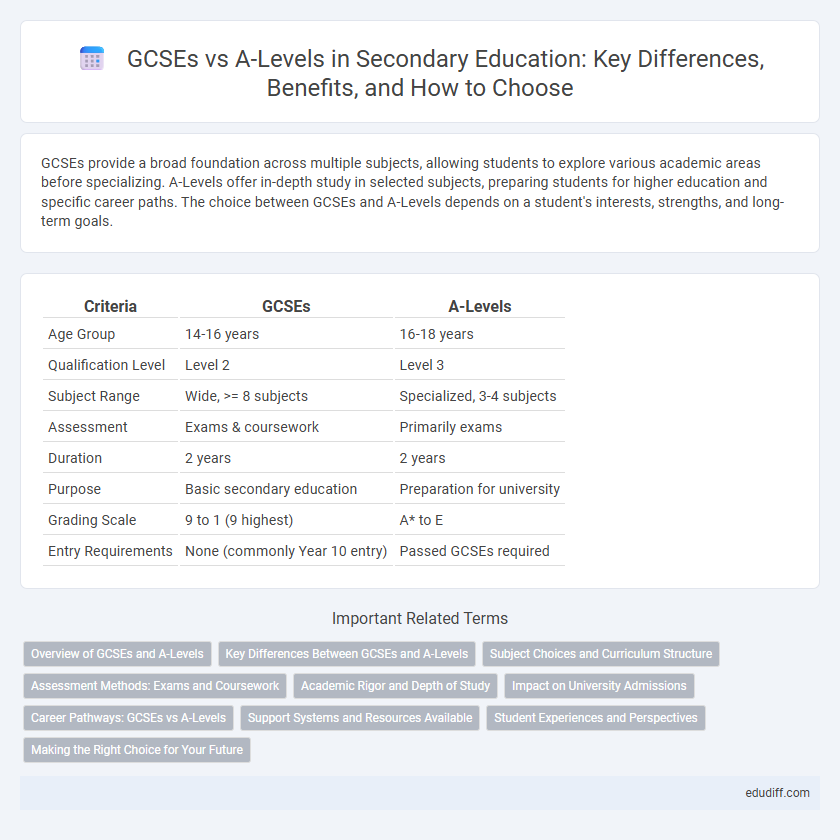GCSEs provide a broad foundation across multiple subjects, allowing students to explore various academic areas before specializing. A-Levels offer in-depth study in selected subjects, preparing students for higher education and specific career paths. The choice between GCSEs and A-Levels depends on a student's interests, strengths, and long-term goals.
Table of Comparison
| Criteria | GCSEs | A-Levels |
|---|---|---|
| Age Group | 14-16 years | 16-18 years |
| Qualification Level | Level 2 | Level 3 |
| Subject Range | Wide, >= 8 subjects | Specialized, 3-4 subjects |
| Assessment | Exams & coursework | Primarily exams |
| Duration | 2 years | 2 years |
| Purpose | Basic secondary education | Preparation for university |
| Grading Scale | 9 to 1 (9 highest) | A* to E |
| Entry Requirements | None (commonly Year 10 entry) | Passed GCSEs required |
Overview of GCSEs and A-Levels
GCSEs (General Certificate of Secondary Education) serve as a foundation qualification in various subjects, typically taken at age 16, assessing knowledge and skills across core and elective courses. A-Levels (Advanced Level) follow GCSEs, offering specialized study in select subjects over two years for students aged 16-18, often required for university admission. Both qualifications play distinct roles in the UK education system, with GCSEs providing broad academic grounding and A-Levels allowing in-depth focus aligned with higher education and career goals.
Key Differences Between GCSEs and A-Levels
GCSEs typically cover a broad range of subjects and are usually completed by students aged 15-16, serving as the foundation for further education or vocational paths. A-Levels, taken at ages 17-18, involve deeper specialization in fewer subjects, preparing students for university courses or advanced career options. The assessment format for GCSEs often includes coursework and exams, whereas A-Levels focus more heavily on final exams to evaluate subject mastery.
Subject Choices and Curriculum Structure
GCSEs offer a broad curriculum covering core subjects like English, Math, Science, and foundation topics, allowing students to explore various disciplines before specialization. A-Levels concentrate on three to four subjects, enabling in-depth study tailored to students' career goals or university requirements. The curriculum structure shifts from a broad knowledge base at GCSE to focused expertise at A-Level, reflecting students' academic progression and subject preferences.
Assessment Methods: Exams and Coursework
GCSEs typically combine exams with coursework to assess a broad range of skills, allowing students to demonstrate practical understanding alongside written knowledge. A-Levels primarily rely on final exams, emphasizing in-depth subject mastery and analytical skills tested under timed conditions. Coursework in A-Levels is generally limited or non-existent, reflecting their focus on exam performance for university readiness.
Academic Rigor and Depth of Study
A-Levels demand greater academic rigor and deeper subject mastery compared to GCSEs, emphasizing critical thinking and independent research skills. GCSEs provide foundational knowledge across a broader range of subjects with a focus on basic concepts and skills development. The transition from GCSEs to A-Levels marks a significant step-up in complexity, preparing students for university-level study.
Impact on University Admissions
A-Levels hold more weight in university admissions as they provide in-depth subject knowledge and are the standard qualification for entry into UK universities. GCSEs assess foundational skills and are prerequisites but carry less influence in the final admission decision. Universities often consider A-Level grades alongside personal statements and references to evaluate a candidate's readiness for higher education.
Career Pathways: GCSEs vs A-Levels
GCSEs provide foundational knowledge across a broad range of subjects, essential for identifying interests and strengths necessary for future career pathways. A-Levels offer specialized study in chosen subjects, enabling deeper expertise that aligns with specific career goals and higher education requirements. Employers and universities often prioritize A-Level results when assessing candidates for advanced roles and academic programs.
Support Systems and Resources Available
GCSEs offer extensive support through structured revision guides, online platforms like BBC Bitesize, and school-based interventions tailored to foundational subjects. A-Levels provide specialized resources including advanced textbooks, subject-specific tutors, and university-style lecture sessions that enhance independent learning skills. Both qualifications benefit from digital apps and peer study groups, but A-Levels emphasize depth of understanding with targeted academic support for university preparation.
Student Experiences and Perspectives
Students often perceive GCSEs as foundational assessments that build essential knowledge and study skills, while A-Levels are viewed as more challenging and specialized, demanding higher levels of critical thinking and independent learning. Many students report increased stress and workload during A-Levels but appreciate the opportunity to deepen subject expertise and prepare for university. The transition from GCSEs to A-Levels frequently involves adapting to different teaching styles and assessment formats, impacting student motivation and confidence.
Making the Right Choice for Your Future
Choosing between GCSEs and A-Levels significantly impacts academic and career pathways, with GCSEs providing a broad foundation across multiple subjects while A-Levels allow for specialization in key areas relevant to university and career goals. Understanding the specific subject requirements for desired university courses or professions is crucial when making this decision. Early consultation with academic advisors and considering long-term aspirations enhances the likelihood of making an informed choice that aligns with future opportunities.
GCSEs vs A-Levels Infographic

 edudiff.com
edudiff.com